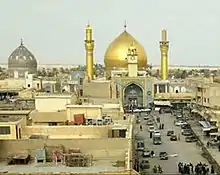Naqvi
The Naqvis are a Sayyid clan, found predominantly in Iran, Iraq, and the South Asian countries. They claim descent from the Imam Ali al-Hadi, who is also known as 'Naqi' and the Tenth Imam, and through him they trace their lineage to the Islamic prophet Muhammad through his younger grandson Husayn ibn Ali.
Lineage
There are differing opinions about the number of sons of Imam Ali al-Naqi. The statement of 7 sons has been made by Ayatullah Syed Basheer Hussain, compiler of the book Shajrate Saddate Amroha, who lists:
- Al-Hasan al-'Askarī and his brothers:
- Muhammad ibn Ali al-Hadi
- Husayn
- 'Abdullāh
- Zayd
- Mūsā
- Ja'far ibn 'Ali al-Hādi , also known as Ja'far al-Zaki or Ja'far Ath-Thāni.
These seven names have also been referenced in the book Anwar-e-Alsadat. In addition, there are at least two people whose hand-written pedigree from the beginning (Imam Naqi) to the end have been accepted. These pedigrees confirm the sons of Imam Ali Naqi Al Hadi as seven in number.[1]
Besides Al-Hasan Al-'Askarī, three of the sons, Husayn, Muhammad and Ja'far, and one daughter named 'Ayliyā' from different wives have been mentioned by various scholars, including Shaikh Mufeed.[2][3][4][5]
Naqvis of Abdullapur Meerut
Naqvi sadaat are also found in Abdullapur, Meerut. They are descendants of Jalaluddin Surkh-Posh Bukhari through Syed Sadarudin Shah Kabir Naqvi Al Bukhari warrior and chief advisor of King Sikandar Lodi and father of great saint Shah Jewna .[6][7][8] They were jagirdars before implementation of Zamidari Abolition Act, 1950. The Pakistani writer, linguist and critic Syed Qudrat Naqvi was born in Abdullapur, he was also known as Syed Shuja’at Ali Naqvi Al-Bukhari; he migrated to Pakistan after the partition of India.[9][10][11][12]
Notable Naqvi Sayyids
- Jalaluddin Surkh-Posh Bukhari, a Sufi saint from Bukhara of Suhrawardiyya Sufi Order
- Jahaniyan Jahangasht, a Sufi saint from Multan, Pakistan of Suhrawardiyya Sufi Order through the youngest son and successor of Jalaluddin Surkh-Posh Bukhari. He was the successor as "Makhdoom E Jahania" after his father.
- Muhammad al-Makki a paternal cousin of Jalaluddin Surkh Posh, through the common ancestor Ja'far ibn Ali al-Hadi. Jalaluddin also married into his family of which the current lineage is from.
- Syed Dewan Shah Abdul Baqi Bewali Guzri a sufi saint from Bewal-Rawalpindi, Pakistan, son of Syed Abdul Wahid Guzri a descendant of Syed Hussain Sharfuddin Shah Wilaayat
- Shah Jewna Naqvi Al Bukhari, a great saint from Kannauj.His father was a warrior and chief advisor of King Sikandar Lodi.
- Syed Muhammad Jewan Shah Naqvi, a Sufi saint from Sialkot, Pakistan. He is also known as Sher Sarwar Sarkar
- Syed Hussain Sharfuddin Shah Wilayat Naqvi, Amroha of Suhrawardiyya Sufi Order
- Syed Muhammad Channan Shah Nuri, a Sufi saint from Allo Mahar, Pakistan of Naqshbandi Sufi Order. Descended from Syed Muhammad Jewan Shah Naqvi
- Brigadier Syed Mujtaba Tirmizi, a Pakistani military senior officer and a filmmaker.
- Syed Sadequain Ahmed Naqvi, a Pakistani calligrapher and painter
- Syed Shehanshah Hussain Naqvi, a Pakistani Shia scholar
- Allama Syed Jawad Naqvi, a Pakistani Shia scholar and Islamic Revolutionary Cleric
- Mukhtar Abbas Naqvi, an Indian politician who is the current Cabinet Minister Of Minority Affairs India Government and MP
- Syed Firdous Shamim Naqvi, a Pakistani politician who is the current leader of the opposition in the Provincial Assembly of Sindh
- Syed Kamal Amrohi, also known as Syed Amir Haider Kamal Naqvi, an Indian film director, producer and screenwriter
- Syed Imran Abbas Naqvi, a Pakistani actor, singer, former model and producer
- Syed Mahmood Naqvi, an Indian scientist, known for development of geochemistry in India and pre-Cambrian geology of South India
- Syed Zafar Ul Hassan Naqvi, a Major General in Pakistan Army
- Kalbe Jawad Naqvi
- H. M. Naqvi
- Mohsin Naqvi
- Arif Naqvi, Pakistani businessman who was the founder and chief executive of the Dubai-based private equity firm, The Abraaj Group and Aman Foundation
- Syed Wajih Ahmad Naqvi
- Ghulam-us-Saqlain Naqvi
- Saeed Naqvi
- Kalbe Razi Naqvi
- Dildar Ali Naseerabadi, a.k.a. Syed Dildar Ali Naqvi
- Maulana Ali Naqi Naqvi, a.k.a. "Naqqan Sahib"
- Syed Mohsin Raza Naqvi
- Yasir Naqvi
- Syed Sajid Ali Naqvi, a shia islamic scholar and patron-in-chief of Shia Ulema Council Pakistan
References
- Page-81 of book "Riaz-ul-Ansab" written by Syed Maqsood Naqvi (Husband of Niece of H.E. Ali Naqi Naqvi), in Urdu Language, published by Izhar Sons Printer, Lahore, Pakistan, in 1979 and 1991
- Najfi, Maulana Syed Safdar Hussain (2014). Ahsanul Maqal (Translation of Arabic Book Muntahal Aamaal fi tarikh al-Nabi wal Aal compiled by Sheikh Abbas Qumi) (in Urdu). Lahore, Pakistan: Misbahulquran Trust. pp. 261–262.
- Ahmed Ali, Syed (1991). Hazrat Imam Ali Naqi Translation of Book compiled by Association of Writers of Idra Dar-e-Raha Haq, Qum Iran (in Urdu). Karachi, Pakistan: Dar'us Saqafa ul-Islamia. p. 5 & 6.
- "IMAM ALI NAQI (AS)". ziaraat.org.
- "IMAM ALI NAQI (AS) - Brief Life". najah.info.
- "Pir-e-Kamil Hazrat Pir Shah Jewna Al-Naqvi Al-Bokhari". www.thenews.com.pk. Retrieved 28 January 2021.
- "Nazaria-i-Pakistan Trust". nazariapak.info. Retrieved 28 January 2021.
- "Pir Shah Jewna: The soul still exudes spirituality". The Nation. 9 May 2016. Retrieved 28 January 2021.
- Parekh, Rauf (12 December 2017). "Syed Qudrat Naqvi and his research on Ghalib". DAWN.COM. Retrieved 16 August 2020.
- "Abdullapur Pin Code, Abdullapur, Meerut Map, Latitude and Longitude, Uttar Pradesh". indiamapia.com. Retrieved 25 December 2020.
- Codingest. "Studio Dharma - by Nikhil Jain". STUDIO DHARMA. Retrieved 25 December 2020.
- "दास्तान ए कर्बला सुन अश्कबार हुई आंखें". Dainik Jagran (in Hindi). Retrieved 1 January 2021.
